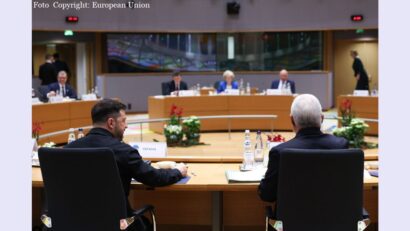Economic Developments in Romania
According to the National Institute of Statistics, after a year and a half of negative values, the annual inflation rate in Romania has turned positive. Consumption prices grew by 0.1% in January as compared to the same period last year, the prices of foodstuffs went up by 1.12%, while the prices of non-food products and services went down by 0.24% and 1% respectively.

Corina Cristea, 16.02.2017, 13:43
According to the National Institute of Statistics, after a year and a half of negative values, the annual inflation rate in Romania has turned positive. Consumption prices grew by 0.1% in January as compared to the same period last year, the prices of foodstuffs went up by 1.12%, while the prices of non-food products and services went down by 0.24% and 1% respectively.
The good news had been announced earlier this week by the Central Bank Governor Mugur Isarescu, who said that the recovery was the result of the impact of the drop in the VAT to 20% wearing off. However, the Governor has warned that the level of inflation will stay below the one previously estimated, and the subsequent growth pace will be slower.
These are all the result of several measures taken by authorities, among which the drop in the price of the compulsory vehicle insurance, the drop in the VAT by another percent, the elimination of 100 fees, and the additional excise tax on fuels, imposed as of January 1st 2017.
According to Mugur Isarescu, the trend of the annual inflation rate will keep going up, will stay flat towards the end of the year, and will grow again in early 2018, to reach values even higher than those initially forecast.
“The risks and uncertainty associated with inflation come from both the inside and the outside, the Central Bank Governor has stated. “Domestically, they are very much the result of the fiscal and income policies implemented. Externally, there are risks relating to the economic growth in the Eurozone, affected by the 2017 election agenda, the Brexit negotiations, the divergence between the monetary policies of the worlds main central banks, and the issues facing the European banking system.
Also as regards the economy, worth mentioning is the recent initiative of the decision-makers in Bucharest to set up the Sovereign Development and Investment Fund, whose aim will be to develop and fund profitable and sustainable projects, worth over 10 billion Euros. Also, the Finance Ministry is working on a new Economic Code, which will bring together the main provisions in the field.
The new law package will comprise the tax codes, the law on setting up commercial companies and the one on tax evasion, and is being developed in cooperation with private businesses. The bill is to be adopted at the end of April and its main goal is to make legislation in the field more accessible. (Translated by M. Ignatescu)






























